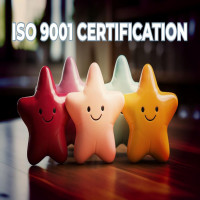ISO Certification Explained: What It Is, Why It Matters, and How to Get Certified

Strong 8k brings an ultra-HD IPTV experience to your living room and your pocket.
In today’s fast-moving business world, customers, partners, and even regulators are more selective than ever. They want assurance—proof that your business delivers consistent quality, follows international best practices, and takes safety, security, and sustainability seriously. That’s where ISO certification comes in.
But what exactly is ISO certification, and how does it help businesses stand out in a competitive marketplace? Let’s break it down in simple terms.
1. What is ISO Certification?
ISO stands for the International Organization for Standardization, an independent, non-governmental international body that develops standards to ensure products, services, and systems are safe, reliable, and high-quality.
ISO certification means that a business or organization has been independently audited and confirmed to comply with the specific requirements of an ISO standard. It’s a formal recognition that the company meets globally accepted benchmarks for everything from quality and environmental management to data security and occupational health.
Importantly, ISO itself does not issue certifications. That job belongs to third-party certification bodies that assess whether an organization meets the criteria laid out in a given ISO standard.
2. Why ISO Certification Matters for Businesses
ISO certification isn’t just for show. It provides real-world value for businesses of all sizes and industries.
1. Builds trust with clients and stakeholders
When customers see that your company is ISO certified, it sends a strong message: you care about quality, compliance, and continual improvement. It builds credibility and trust, especially in competitive or regulated markets.
2. Improves internal processes
ISO standards require organizations to streamline operations, document procedures, and identify risks. This leads to greater efficiency, fewer errors, and more consistent results.
3. Opens doors to new business
Many government agencies and large corporations require ISO certification to qualify for contracts. Without it, you might not even make it past the first round of consideration.
4. Reduces costs in the long run
By focusing on quality management, risk reduction, and continuous improvement, ISO-certified companies often experience fewer product recalls, less waste, and more satisfied customers.
3. Common Types of ISO Standards
There are over 24,000 ISO standards in existence, but here are the ones most relevant to businesses across various sectors:
ISO 9001 – Quality Management Systems
The most widely adopted ISO standard. It helps organizations meet customer expectations and regulatory requirements while driving continuous improvement.
ISO 14001 – Environmental Management Systems
Focuses on reducing environmental impact, ensuring compliance with environmental laws, and improving sustainability practices.
ISO 27001 – Information Security Management Systems
Vital for any business handling sensitive data. It helps safeguard digital and physical information assets from threats and breaches.
ISO 45001 – Occupational Health and Safety Management Systems
Supports organizations in providing a safer, healthier workplace, reducing accidents and meeting legal health and safety obligations.
ISO 22000 – Food Safety Management Systems
Ideal for organizations in the food industry. It addresses food safety hazards throughout the supply chain to protect public health.
Each ISO standard is designed with a specific goal in mind, but they all follow a risk-based, process-oriented approach—which makes them versatile and scalable across sectors.
4. The Process of Getting ISO Certified
Getting ISO certified might sound daunting, but it becomes manageable when broken down into steps:
Step 1: Choose the right ISO standard
Decide which standard aligns with your business goals. For example, a SaaS company may pursue ISO 27001, while a manufacturing firm might go for ISO 9001 and ISO 14001.
Step 2: Gap analysis and planning
Evaluate your current processes to identify what you already do well and where improvements are needed. A gap analysis helps highlight the areas that don’t yet meet the requirements of the chosen standard.
Step 3: Implement changes
Based on the gap analysis, update your internal systems, train your staff, and document your procedures to align with the ISO standard’s requirements.
Step 4: Conduct internal audits
Before bringing in an external auditor, perform a self-assessment or internal audit to catch any issues early and fine-tune your systems.
Step 5: Hire a certification body
Work with an accredited third-party certification body. They will review your documentation, observe your operations, and conduct a formal audit. If you pass, you’ll receive your ISO certificate.
Step 6: Maintain and improve
ISO certification isn’t a one-and-done deal. You’ll need to maintain compliance, conduct annual surveillance audits, and continuously improve your systems to retain certification.
Conclusion
ISO certification is more than a stamp of approval—it’s a strategic investment in your business’s future. It strengthens your brand, improves operational performance, and unlocks new market opportunities. Whether you’re a small startup or a multinational corporation, pursuing ISO certification can help set you apart in a world where quality and accountability matter more than ever.
If you're serious about growing your business, ISO certification isn't just an option—it's a smart next step.
Note: IndiBlogHub features both user-submitted and editorial content. We do not verify third-party contributions. Read our Disclaimer and Privacy Policyfor details.



